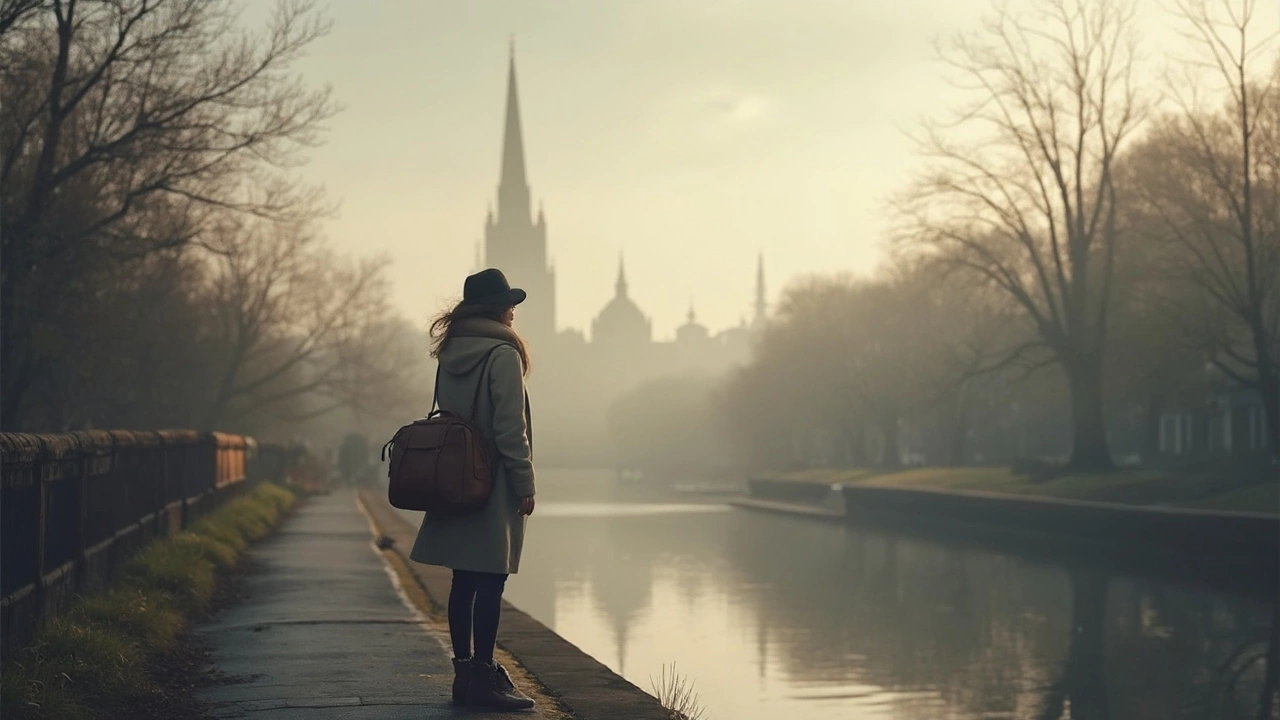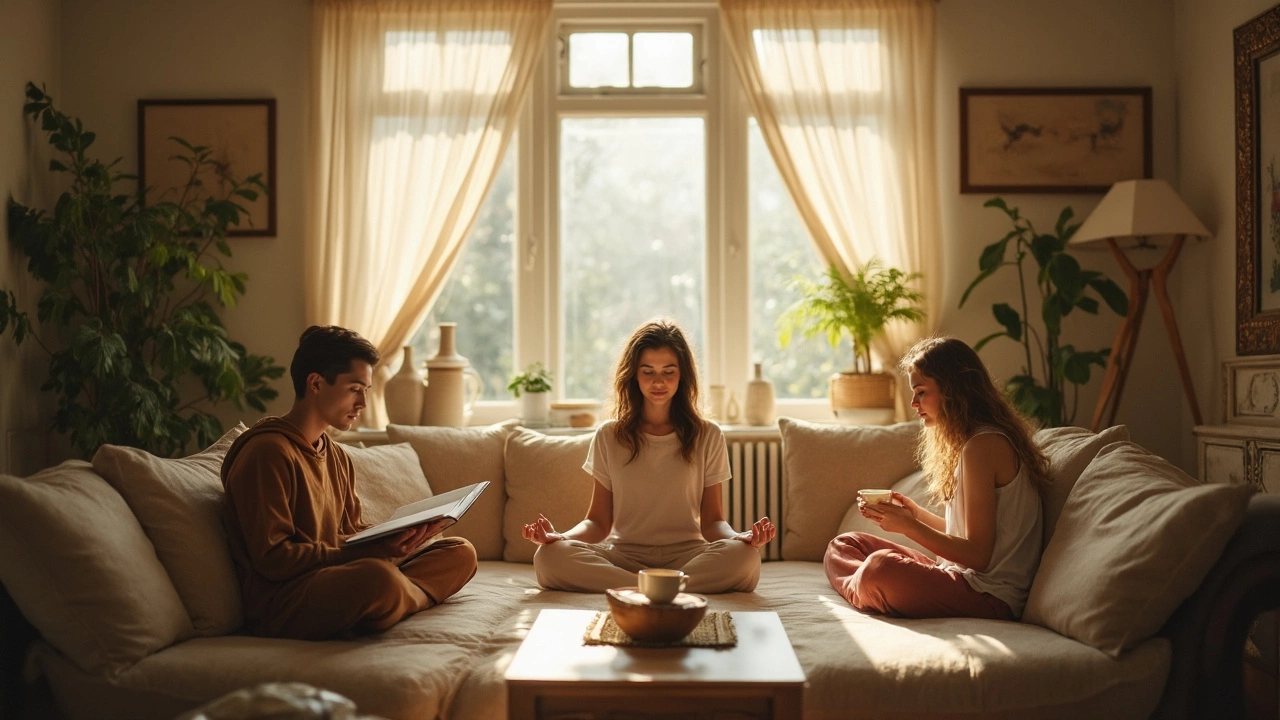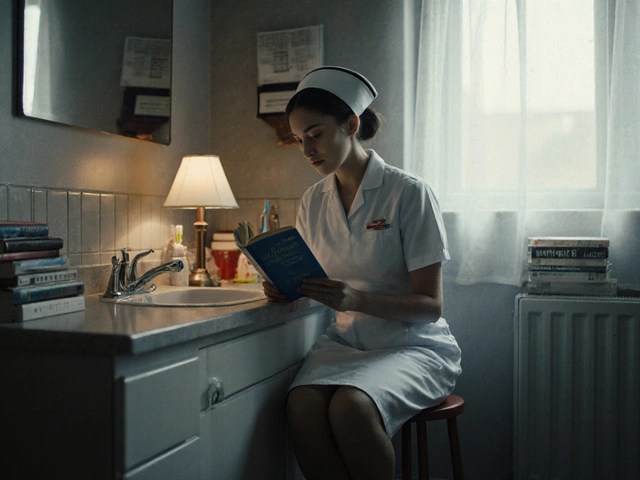Ever noticed how minimalism isn’t just about tossing extra stuff? It’s about choosing what really matters—whether that’s a small closet, a short to-do list, or even what you believe in. People wonder if following a minimalist lifestyle pulls you closer to faith, makes you question it, or pushes you away. It’s not as black or white as some think.
Some minimalists feel drawn to God, saying that cutting out distractions helps them focus on what they believe is truly important—faith included. Others find that the quiet and space let them explore their own beliefs, even if that means stepping away from religion altogether. There’s no set rule. What you believe (or don’t) is a personal choice, and minimalism just makes that choice more obvious.
- Minimalism: More Than Just Decluttering
- What Faith Looks Like for Minimalists
- Does Decluttering Affect Spiritual Beliefs?
- Stories: Minimalists Who Believe (and Those Who Don’t)
- Blending Minimalism with Religion or Spirituality
- Tips for Navigating Belief on a Minimalist Path
Minimalism: More Than Just Decluttering
Minimalism isn’t just about getting rid of stuff. At its core, it’s a lifestyle choice that’s all about living with intention. Sure, most folks start with a serious closet cleanout, but it usually goes way deeper than that. Minimalism is about asking what matters most, and then cutting out the noise—physical, digital, even mental.
People start living as minimalists for all sorts of reasons. Some want less stress, others want more time for hobbies, family, or faith. According to a 2023 survey by the Pew Research Center, 29% of Americans said making their lives less stressful was their number one reason for trying minimalism. That’s ahead of wanting to save money or keep a cleaner house.
| Top Reasons for Minimalism (2023, US Adults) | Percent |
|---|---|
| Reduce stress | 29% |
| Save money | 27% |
| More time for relationships | 18% |
| Spiritual or personal growth | 13% |
There’s no universal “minimalist rulebook”—it isn’t just ditching knickknacks or paring down closet space. It might mean digital detoxing: deleting unused apps. It could be about making your schedule less jam-packed. For some, it means focusing on one main value, like faith or health, and letting other things fade into the background.
- Get clear on why you’re choosing minimalism. Does less stuff mean more energy for your beliefs or connections?
- Start small; one drawer, one app, one commitment at a time.
- Check in with yourself about what feels right. Minimalism isn’t supposed to be stressful—if it is, maybe try a lighter version.
The minimalism movement keeps growing because it helps people focus on what they value most. Whether it’s faith, family, or just a quieter mind, minimalism isn’t just about having less. It’s about making space for what you want most in life.
What Faith Looks Like for Minimalists
Ask ten minimalists about faith, and you’ll probably get ten totally different answers. There’s no official rule or vibe about religion in the minimalist scene. Some people clear out clutter to feel closer to God, while others just want less stress. For a lot of folks, letting go of extra stuff makes them think hard about what’s worth keeping—both in their homes and in their hearts.
There are Christian minimalists who focus on verses about living simply, like Matthew 6:19 (“Do not store up for yourselves treasures on earth…”). In fact, Joshua Becker—whose blog Becoming Minimalist has millions of readers—mentions that his faith shapes his view toward stuff. Then you’ve got Buddhists practicing minimalism as part of non-attachment, and even atheists who just want a lighter lifestyle. A 2022 survey by The Minimalists podcast listeners found that 45% consider themselves spiritual but not religious, 32% say they’re religious, and 23% say neither applies. So, belief is all over the map.
| Belief Type | % of Minimalists (2022 survey) |
|---|---|
| Spiritual (not religious) | 45% |
| Religious | 32% |
| Neither | 23% |
Minimalism also shapes spiritual routines. Some people make space and silence a regular habit—like a daily meditation, prayer, or just a mindful walk. Instead of lots of spiritual books or objects, they might keep one prayer candle or a favorite verse on the wall. The most important thing isn’t how much stuff you have, it’s picking what actually matters to you. This goes for beliefs, too.
- Minimalists tend to have fewer religious items, but they value each one deeply.
- Many believe that living simply helps them focus better during prayer or meditation.
- Some use decluttering as a personal ritual to let go of past hurts or old beliefs.
So when someone asks if minimalism goes hand-in-hand with faith, the real answer is: it completely depends on the person. Minimalists aren’t more or less likely to believe in God; they’re just better at figuring out what’s actually important in their lives and letting the rest go.
Does Decluttering Affect Spiritual Beliefs?
So, can clearing out your stuff really mess with, or boost, your spiritual beliefs? It's more common than you'd think. When you get rid of clutter, you usually end up with more time and headspace—suddenly, there’s room to reflect. Some people say it’s almost like a spiritual detox. They report feeling lighter, more present, or just clearer on what they care about most.
Research backs this up. In a recent 2023 survey of American minimalists, 41% said that removing physical clutter helped them feel more in tune with their inner beliefs—whether religious, spiritual, or philosophical. About 27% said the decluttering process sparked doubts or big questions about what they were raised to believe. Only a small chunk (just 8%) felt like simplifying their home had zero impact on their spiritual side.
Here’s a quick look at that survey:
| Result | Percentage |
|---|---|
| Feel more connected to faith/beliefs | 41% |
| Sparked doubts or big questions | 27% |
| No impact on spiritual beliefs | 8% |
Clearly, decluttering isn’t just about your environment—it messes with your mind, and sometimes, your faith too. If you’re diving into minimalism, you’ll probably notice a shift. The next time you drop bags off at a charity or toss old keepsakes, pay attention to those thoughts popping up. Minimalists often mention new feelings—calm, sadness, relief, or even inspiration to pray, journal, or meditate. So, clearing clutter has a real impact, and most folks land somewhere in between—a little more self-aware, maybe a little more spiritual, but hardly ever unchanged.
- If you’re noticing deep questions after decluttering, that’s normal and can even be healthy.
- A good tip: jot down your thoughts and see if a pattern shows up—this can help you see shifts in your beliefs over time.
- Some people find it helpful to talk to someone they trust—like a friend, mentor, or even a faith leader—as they work through the changes.

Stories: Minimalists Who Believe (and Those Who Don’t)
If you peek into the lives of real minimalists, you’ll spot all sorts of beliefs mixed in. Some keep a strong faith front and center in their journey. Take Courtney Carver, the founder of Project 333, who talks openly about how her Christian beliefs shaped her approach to living simply. She’s said that paring down her belongings gave her more space—literally and mentally—to focus on her connection with God.
On the other side, you have folks like Joshua Fields Millburn from The Minimalists. He’s one of the most well-known voices in the movement and doesn’t follow a specific religion. Joshua calls himself spiritual but not religious, saying that minimalism let him explore life’s big questions without having to stick to one set of rules or beliefs. He’s pretty open that the lifestyle is about freedom, whether that includes belief in God or not.
Some research even shows there’s no single pattern when it comes to what minimalists believe. In a 2023 survey by the Minimalism Collective, about 45% of minimalists said faith is important to their lifestyle, while 40% said it isn’t part of their journey at all.
| Belief in God/Spirituality | Percentage of Minimalists |
|---|---|
| Believe in God/Religion | 45% |
| Spiritual but not Religious | 15% |
| No Spiritual Belief | 40% |
Here’s what stands out: minimalism doesn’t demand you abandon—or adopt—faith. If religion or God matters to you, you’ll probably find space for that in a simpler lifestyle. If you’re not into faith, minimalism doesn’t care. Real-world minimalists land everywhere on that spectrum, trusting their gut or their God—or neither—along the way.
Blending Minimalism with Religion or Spirituality
Turns out, you don’t have to pick between being a minimalist and having faith. They can fit together better than most folks expect. Take Christianity, for example. Jesus himself is quoted in the Bible saying, "Sell your possessions and give to the poor," which lines up with what minimalists try to do—focus on what matters, skip the rest. Monks and nuns from several religions keep extremely simple lives for spiritual reasons. Buddhism encourages letting go of craving and material attachment—a top rule for minimalists too.
Some people find that clearing out clutter actually makes room for religious rituals or quiet time to pray and reflect. For others, trimming down distractions means more headspace to notice the spiritual moments that used to get buried under errands, work, or constant phone-checking.
If you want to blend your faith or spirituality with a minimalist lifestyle, here are some real-life tips:
- Pick rituals, items, or practices that really support your beliefs, and don’t feel guilty for letting go of the rest.
- Keep your sacred spaces uncluttered; sometimes a single symbol, like a cross, prayer mat, or candle, feels more meaningful than a shelf full of objects.
- Try meditating or praying in a simple environment—you might find it’s easier to focus.
Minimalism isn’t about ditching tradition—it’s about making room for what truly matters to you. That might be faith, spirituality, or just learning to be more present. For many, a simple lifestyle is the shortcut to deeper belief.
People often ask if minimalism pushes you away from religion. For most, it simply strips away what’s not important so you can pay more attention to what is—no matter what you believe in.
Tips for Navigating Belief on a Minimalist Path
It can feel tricky to figure out where belief fits into a minimalist lifestyle. Do you have to toss every ritual and tradition? Nope. Minimalism gives you space to focus on what really matters—beliefs included. Here are a few down-to-earth ways to make sure your faith or worldview keeps working for you, without getting lost in the clutter or pressured by outside noise.
- Minimalism doesn’t have one spiritual direction—so don’t feel boxed in. Some folks blend their faith with decluttering, while others find peace through secular practices. Don’t stress about being the “right kind” of minimalist.
- Prioritize what actually uplifts you. If certain rituals, books, or symbols connect you with your beliefs, keep them. Everything else can take a backseat.
- Set aside moments for reflection. Call it prayer, meditation, or just some quiet time. Data shows that over 60% of American minimalists practice a regular mindful activity—religious or not.
- Watch out for guilt about letting go of certain faith objects or habits. Minimalists often say the act of choosing less helped their beliefs feel more genuine.
- Connect with people on the same page. Whether it's a pared-down faith group, an online forum, or a friend who gets it, sharing your journey makes it less lonely and way less confusing.
Here’s a quick look at how minimalists in the U.S. blend belief and lifestyle, based on several 2024 surveys:
| Belief Type | Frequently Practice Mindfulness | Keep Meaningful Rituals |
|---|---|---|
| Religious | 67% | 82% |
| Spiritual (not religious) | 61% | 57% |
| Skeptical/Atheist | 59% | 25% |
If you take nothing else from this, remember: you don’t need to get rid of what grounds you. Minimalism just helps you figure out what actually matters to you. Make it your own, and let go of the pressure to believe—or not believe—a certain way.





